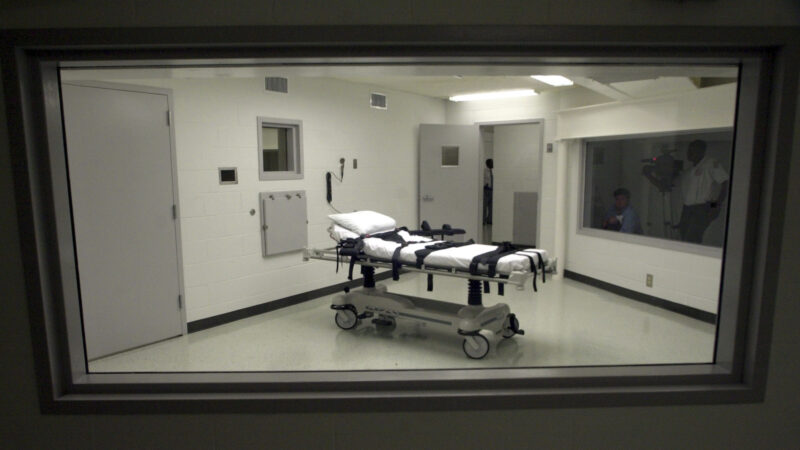Will other states replicate Alabama’s nitrogen execution?
Alabama's lethal injection chamber at Holman Correctional Facility in Atmore, Ala., is pictured in this Oct. 7, 2002 file photo.
By Kim Chandler and Sean Murphy
ATMORE, Ala. (AP) — Alabama’s first-ever use of nitrogen gas for an execution could gain traction among other states and change how the death penalty is carried out in the United States, much like lethal injection did more than 40 years ago, according to experts on capital punishment.
Alabama Attorney General Steve Marshall said Friday that the execution of Kenneth Eugene Smith, a 58-year-old convicted of a 1988 murder-for-hire, went off as planned and his office is ready to help other states if they want to begin nitrogen executions.
“Alabama has done it, and now so can you,” Marshall said at a news conference.
At least some prison officials in other states say they hope to closely analyze how the process worked in Alabama and whether to replicate it in their states. Oklahoma and Mississippi already have laws authorizing the use of nitrogen gas for executions, and some other states, including Nebraska, have introduced measures this year to add it as an option.
“Our intentions are if this works and it’s humane and we can, absolutely we’ll want to use it,” said Steven Harpe, director of Oklahoma’s prison system.
After being outfitted with a face mask that forced him to breathe pure nitrogen and deprived him of oxygen, Smith shook and writhed on the gurney for at least two minutes during Thursday night’s execution at an Alabama prison before his breathing stopped and he was declared dead.
Alabama Corrections Commissioner John Q. Hamm described Smith’s shaking as involuntary movements and said nothing was out of the ordinary during the procedure.
“That was all expected and was in the side effects that we’ve seen or researched on nitrogen hypoxia,” Hamm said.
Harpe and his chief of staff, Justin Farris, who rewrote Oklahoma’s lethal injection protocols after a botched execution in 2014, already have traveled to Alabama to see the equipment corrections officials obtained for the nitrogen execution and to study its protocols.
“We want to see how well it works, how fast it works and how efficient it is,” Farris said. “I think the nation, as far as correctional entities, is watching this to see how it’s done.”
The United States has a long history of developing methods of execution that quickly become widely adopted, starting with electrocution in the early 1900s to replace hangings, followed by the gas chamber and ultimately lethal injection, which was developed by an Oklahoma doctor in the 1970s. The switch to nitrogen gas could be the next method to gain popularity, said Austin Sarat, a law professor at Amherst College who has written extensively about botched executions and the death penalty.
“This is a chapter in a long-running story in the United States,” Sarat said. “Since the late 1900s, the United States has been on a quest to find a method of execution that would be a kind of technological magic bullet and would ensure that executions would be safe, reliable and humane.
“Why are we on that quest? Because we want to have the death penalty, but we want to be able to say the death penalty is not cruel.”
Oklahoma was the first state to contemplate the use of nitrogen gas nearly a decade ago after the 2014 botched execution of Clayton Lockett who clenched his teeth, moaned and writhed on the gurney before a doctor noticed a problem with the intravenous line and the execution was called off before Lockett died, 43 minutes after the procedure began. A later investigation revealed the IV had become dislodged and the lethal chemicals were pumped into the tissue surrounding the injection site instead of into his bloodstream.
Numerous other states, including Alabama, have had problems for years administering lethal injection or obtaining the deadly drugs, particularly as manufacturers, many of them based in Europe, have objected to their drugs being used to kill people and prohibited their sale to corrections departments or stopped manufacturing them altogether.
Even as some death penalty states remain committed to pursuing the executions, capital punishment is undergoing a yearslong decline of use and support, and more Americans now believe the death penalty is being administered unfairly, according to a recent annual report.
A majority of states, 29, have either abolished the death penalty or paused executions, and there were just 24 executions carried out in five U.S. states in 2023, according to Washington, D.C.-based Death Penalty Information Center.
“More states have abolished the death penalty since 2007 than in any other comparable 17-year period in American history,” Sarat noted. “This national consideration is not just being driven by moral qualms, it’s being driven by the sense that it’s a broken system.”
Ryan Kiesel, a former Oklahoma legislator and civil rights attorney who fought against Oklahoma’s efforts to approve nitrogen gas as then-director of the state chapter of the American Civil Liberties Union, said the continued push for a new method is a futile attempt by states to sanitize a violent act.
“Perhaps instead of trying to move to more and more palatable ways of killing someone, if a state wants to have a death penalty, they should have a method that reflects the violent act that execution is,” Kiesel said. “If we can’t stomach it, we shouldn’t do it.”
North Carolina and Texas have primary elections Tuesday. Here’s what you need to know
The midterm elections are officially underway and contests in Texas and North Carolina will be the first major opportunity for parties to hear from voters about what's important to them in 2026.
Trump promised the MAGA base no new wars. Then he went to war with Iran
President Trump promised his "Make America Great Again" voters an "America First" foreign policy. With the war in Iran, he's testing MAGA world's willingness to be flexible on one of its core beliefs.
Kristi Noem set to face senators over DHS shutdown, immigration enforcement
The focus of the hearing is likely to be on how Kristi Noem is pursuing President Trump's mass deportation efforts in his second term, after two U.S. citizens were killed by immigration officers.
College students, professors are making their own AI rules. They don’t always agree
More than three years after ChatGPT debuted, AI has become a part of everyday life — and professors and students are still figuring out how or if they should use it.
Melania Trump presides at UN Security Council meeting as U.S. attacks Iran
U.S. first lady Melania Trump presided over a U.N. Security Council meeting on Monday focusing on children in conflict, as the United States has joined Israel in attacking Iran.
In Vermont, small town meetings grapple with debate on big issues
Typically concerned with local issues, residents at town meetings in Vermont and elsewhere increasingly use the forum to debate polarizing national and international events.








